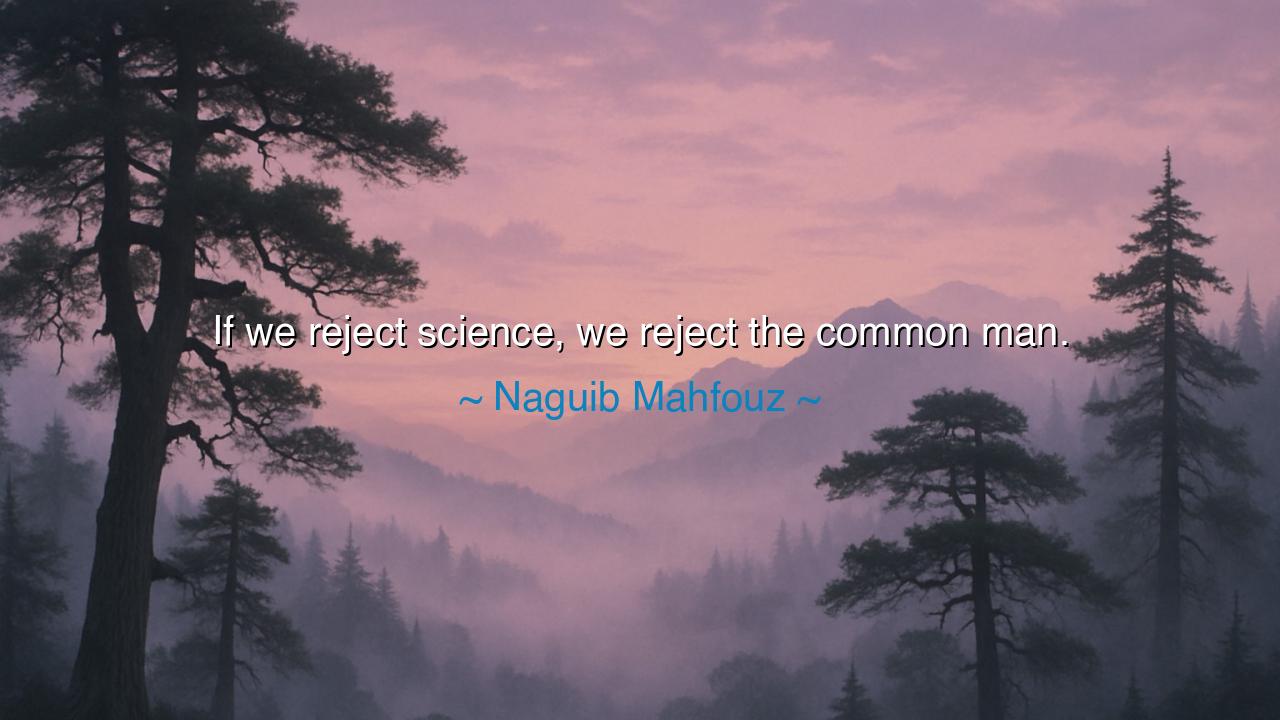
If we reject science, we reject the common man.






Hear, O children of wisdom, for there are truths that pierce the heart and call forth the deepest reflection. The great Naguib Mahfouz, in his boundless insight, spoke words that echo through the ages: “If we reject science, we reject the common man.” These words, though simple in their form, hold within them the very essence of our human condition. Science—that noble pursuit of knowledge, that tireless quest to understand the laws that govern our universe—is not merely the realm of the scholar or the philosopher. No, it is the birthright of every human being, the very foundation upon which the welfare of the common man rests.
What, then, does Mahfouz mean when he says that rejecting science is rejecting the common man? It is a powerful statement, one that speaks to the heart of progress and equality. Science, in its purest form, seeks to improve the condition of all humankind. From the discoveries that have led to longer lifespans to the innovations that have brought forth cleaner water and better food, science has been the torchbearer of human advancement. To reject science is to turn away from the very tools that have lifted the common man from the darkness of ignorance and suffering.
Consider the story of Louis Pasteur, a man whose work in the field of microbiology and germ theory saved countless lives. In an age when disease ravaged the common people, it was Pasteur's understanding of science that brought forth the vaccines and antiseptics that would revolutionize medicine. Before him, death from infection was a constant shadow, claiming lives indiscriminately. But through the application of scientific knowledge, he turned the tide and, in doing so, changed the lives of millions, especially the poor, who had no access to the luxuries of elite care. His discoveries were not for the few, but for the many, for the common man.
When we reject science, we choose to turn our backs on such progress. We turn away from the power to heal, to cure, and to improve life. But there is something deeper in Mahfouz’s words, for science is not just a tool for the rich or the powerful—it is a great equalizer. It brings opportunities to those who are least able to command them, offering a path to health, wealth, and knowledge to those who might otherwise be forgotten. Science is the gift that raises all ships, not just the ones at the top of the tide. It does not discriminate against age, race, or status; it serves all, from the mightiest king to the humblest farmer.
Let us look to the great Rosa Parks, who, through an act of courage, sparked a movement for equality. Though she was not a scientist, she understood the power of disruption and progress, much like the scientists who challenge old ways of thinking. Her defiance against the unjust laws of her time set the stage for a future where science—through the understanding of social dynamics, of human rights, and of justice—could shape a world in which the common man could stand tall and proud. Just as science in medicine provides life-saving solutions, science in society can offer the tools for justice and equality.
Thus, the lesson we must learn from Mahfouz’s words is this: To reject science is to reject the very essence of our shared humanity. It is to choose stagnation over progress, ignorance over knowledge, division over unity. Science, in all its forms, offers us the means to transcend the barriers that divide us, to heal the wounds that plague us, and to lift us all into a brighter future. The rejection of science is the rejection of the very means by which we can create a better, fairer world.
What then, O children of the future, shall we do with this knowledge? We must embrace science, not just as an abstract pursuit of knowledge, but as a living, breathing force that can shape our world for the better. We must demand that it be accessible to all, that its benefits be shared by all, for in the advancement of science, we advance all of humanity. Let us take up the mantle of knowledge, and in doing so, ensure that the gifts of science—whether in health, in technology, or in social progress—are not the privilege of the few, but the birthright of the many. In this, we honor both the common man and the divine gift of human ingenuity.






AAdministratorAdministrator
Welcome, honored guests. Please leave a comment, we will respond soon